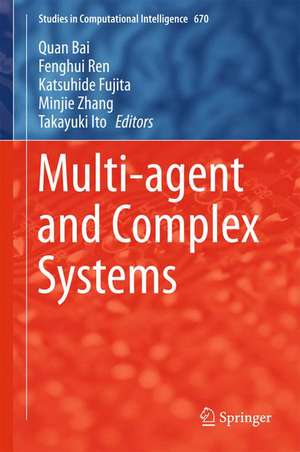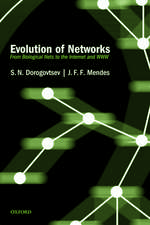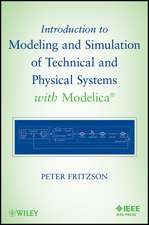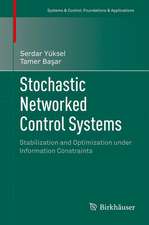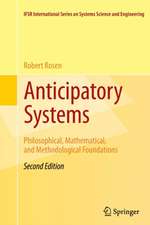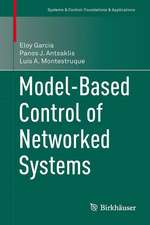Multi-agent and Complex Systems: Studies in Computational Intelligence, cartea 670
Editat de Quan Bai, Fenghui Ren, Katsuhide Fujita, Minjie Zhang, Takayuki Itoen Limba Engleză Hardback – 16 noi 2016
| Toate formatele și edițiile | Preț | Express |
|---|---|---|
| Paperback (1) | 940.87 lei 6-8 săpt. | |
| Springer Nature Singapore – 22 apr 2018 | 940.87 lei 6-8 săpt. | |
| Hardback (1) | 946.87 lei 6-8 săpt. | |
| Springer Nature Singapore – 16 noi 2016 | 946.87 lei 6-8 săpt. |
Din seria Studies in Computational Intelligence
- 20%
 Preț: 449.37 lei
Preț: 449.37 lei - 20%
 Preț: 1158.26 lei
Preț: 1158.26 lei - 20%
 Preț: 986.66 lei
Preț: 986.66 lei - 20%
 Preț: 1452.76 lei
Preț: 1452.76 lei - 20%
 Preț: 168.78 lei
Preț: 168.78 lei - 18%
 Preț: 1112.30 lei
Preț: 1112.30 lei - 20%
 Preț: 565.38 lei
Preț: 565.38 lei - 20%
 Preț: 649.28 lei
Preț: 649.28 lei - 20%
 Preț: 1047.73 lei
Preț: 1047.73 lei - 20%
 Preț: 1578.96 lei
Preț: 1578.96 lei - 20%
 Preț: 643.50 lei
Preț: 643.50 lei - 20%
 Preț: 657.49 lei
Preț: 657.49 lei - 20%
 Preț: 993.28 lei
Preț: 993.28 lei - 20%
 Preț: 990.80 lei
Preț: 990.80 lei - 20%
 Preț: 989.96 lei
Preț: 989.96 lei - 20%
 Preț: 1165.69 lei
Preț: 1165.69 lei - 20%
 Preț: 1444.52 lei
Preț: 1444.52 lei - 20%
 Preț: 1041.96 lei
Preț: 1041.96 lei - 20%
 Preț: 1047.73 lei
Preț: 1047.73 lei - 20%
 Preț: 1046.06 lei
Preț: 1046.06 lei - 18%
 Preț: 2500.50 lei
Preț: 2500.50 lei - 20%
 Preț: 989.13 lei
Preț: 989.13 lei - 20%
 Preț: 1165.69 lei
Preț: 1165.69 lei - 20%
 Preț: 1164.05 lei
Preț: 1164.05 lei - 20%
 Preț: 1042.79 lei
Preț: 1042.79 lei - 20%
 Preț: 1460.19 lei
Preț: 1460.19 lei - 18%
 Preț: 1403.52 lei
Preț: 1403.52 lei - 18%
 Preț: 1124.92 lei
Preț: 1124.92 lei - 20%
 Preț: 1039.47 lei
Preț: 1039.47 lei - 20%
 Preț: 1008.11 lei
Preț: 1008.11 lei - 20%
 Preț: 1045.25 lei
Preț: 1045.25 lei - 20%
 Preț: 1275.42 lei
Preț: 1275.42 lei - 20%
 Preț: 1040.32 lei
Preț: 1040.32 lei - 20%
 Preț: 988.32 lei
Preț: 988.32 lei - 20%
 Preț: 1169.79 lei
Preț: 1169.79 lei - 20%
 Preț: 1162.37 lei
Preț: 1162.37 lei - 20%
 Preț: 1059.26 lei
Preț: 1059.26 lei - 20%
 Preț: 1164.05 lei
Preț: 1164.05 lei - 20%
 Preț: 1166.52 lei
Preț: 1166.52 lei - 20%
 Preț: 1459.38 lei
Preț: 1459.38 lei - 18%
 Preț: 1005.74 lei
Preț: 1005.74 lei - 20%
 Preț: 997.38 lei
Preț: 997.38 lei - 20%
 Preț: 1055.94 lei
Preț: 1055.94 lei - 20%
 Preț: 1284.47 lei
Preț: 1284.47 lei - 20%
 Preț: 994.08 lei
Preț: 994.08 lei - 20%
 Preț: 1048.72 lei
Preț: 1048.72 lei - 20%
 Preț: 1066.02 lei
Preț: 1066.02 lei - 20%
 Preț: 943.78 lei
Preț: 943.78 lei - 20%
 Preț: 1173.10 lei
Preț: 1173.10 lei - 20%
 Preț: 1457.72 lei
Preț: 1457.72 lei
Preț: 946.87 lei
Preț vechi: 1154.72 lei
-18% Nou
Puncte Express: 1420
Preț estimativ în valută:
181.18€ • 189.17$ • 149.95£
181.18€ • 189.17$ • 149.95£
Carte tipărită la comandă
Livrare economică 04-18 aprilie
Preluare comenzi: 021 569.72.76
Specificații
ISBN-13: 9789811025631
ISBN-10: 9811025630
Pagini: 202
Ilustrații: VIII, 210 p. 73 illus., 43 illus. in color.
Dimensiuni: 155 x 235 x 14 mm
Greutate: 0.49 kg
Ediția:1st ed. 2017
Editura: Springer Nature Singapore
Colecția Springer
Seria Studies in Computational Intelligence
Locul publicării:Singapore, Singapore
ISBN-10: 9811025630
Pagini: 202
Ilustrații: VIII, 210 p. 73 illus., 43 illus. in color.
Dimensiuni: 155 x 235 x 14 mm
Greutate: 0.49 kg
Ediția:1st ed. 2017
Editura: Springer Nature Singapore
Colecția Springer
Seria Studies in Computational Intelligence
Locul publicării:Singapore, Singapore
Cuprins
1.Adaptive Forwarder Selection for Distributed Wireless Sensor Networks.- 2.Trust Transference on Social Exchanges among Triads of Agents Based on Dependence Relations and Reputation.- 3.A Multiagent-Based Domain Transportation Approach for Optimal Resource Allocation in Emergency Management.- 4.A proto-type of a portable ad hoc simple water gauge and real world evaluation.- 5.Exploiting Vagueness for Multi-Agent Consensus 6.Selecting Robust Strategies Based on Abstracted Game Models.- 7.Simulating and Modeling Dual Market Segmentation Using PSA Framework.- 8.CORPNET: Towards a Decision Support System for Organizational Network Analysis using Multiplex Interpersonal Relations.- 9.Membership Function Based Matching Approach of Buyers and Sellers Through a Broker in Open E-Marketplace.- 10.The Effect of Assertiveness and Empathy on Heider's Balance Theory for Friendship Network Models information on submission.- 11.Associative Memory-based Approach to Multi-task Reinforcement Learning under Stochastic Environments.- 12.Preliminary Estimating Method of Opponent's Preferences using Simple Weighted Functions for Multi-lateral Closed Multi-issue Negotiations.- 13.Multi-Objective Nurse Rerostering Problem.- 14.Preference Aware Influence Maximization.- 15.Norm Emergence through Collective Learning and Information Diffusion in Complex Relationship Networks.- 16.Agent-Based Computation of Decomposition Games with Application in Software Requirements Decomposition.
Notă biografică
Quan Bai
Auckland University of Technology
Fenghui Ren
University of Wollongong
Minjie Zhang
University of Wollongong
Takayuki Ito
Nagoya Institute of Technology
Katsuhide Fujita
Tokyo University of Agriculture and Technology
Textul de pe ultima copertă
This book provides a description of advanced multi-agent and artificial intelligence technologies for the modeling and simulation of complex systems, as well as an overview of the latest scientific efforts in this field. A complex system features a large number of interacting components, whose aggregate activities are nonlinear and self-organized. A multi-agent system is a group or society of agents which interact with others cooperatively and/or competitively in order to reach their individual or common goals. Multi-agent systems are suitable for modeling and simulation of complex systems, which is difficult to accomplish using traditional computational approaches.
Caracteristici
Will interest both AI and system modeling researchers Targets the most recent research outputs in smart simulation and modeling Contributes to a better understanding of intelligent modeling for complex systems Includes supplementary material: sn.pub/extras
